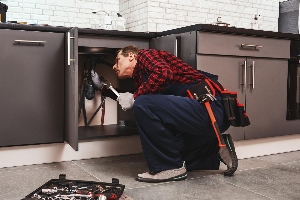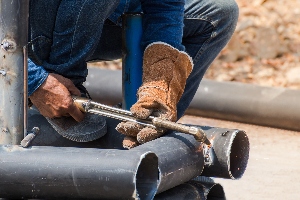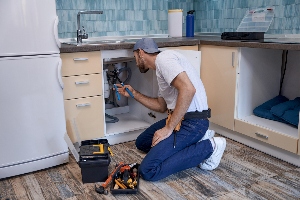If you're questioning whether a whole house water filter can enhance the taste of your water, you're not alone. Many homeowners are curious about the benefits of installing such a system and how it impacts their daily water consumption. A whole house water filter can significantly improve water taste by reducing chlorine, sediment, and other impurities that often affect flavor.
Water quality can vary greatly depending on your location and the source of your water. Even the most reliable municipal supplies may contain contaminants that linger in taste and odor. By filtering your entire home's water supply, you can enjoy cleaner, fresher water straight from the tap, making it more appealing for drinking, cooking, and even bathing.
Investing in a whole house water filter not only addresses concerns about taste but also improves the overall quality of the water you and your family use every day. You may find that a simple upgrade transforms your perception of water, encouraging healthier hydration habits.
Understanding Water Contaminants
Water in your home may contain various contaminants that affect its taste and safety. Common contaminants include chlorine, often used in municipal water systems to disinfect, which can leave a chemical aftertaste.
Heavy metals are a concern as well. Substances like lead, copper, andmanganese can leach into the water supply from aging pipes. Their presence not only alters flavor but may pose health risks.
Sediments such as rust, sand, and dust can compromise the clarity of your water. This sediment can contribute to an unpleasant taste and may indicate other underlying issues.
Organic compounds and volatile organic compounds (VOCs), frequently found in pesticides and industrial chemicals, can also impact water quality. These substances often result from agricultural runoff or chemical spills.
Microorganisms, including bacteria and viruses, can infiltrate water sources, introducing potential health hazards. These contaminants are especially concerning in untreated water.
You may also encounter pesticides from agricultural activities affecting your water supply. Understanding these contaminants helps you assess whether a whole house water filter can enhance your water’s taste and safety.
Basics of Water Filtration Systems
Water filtration systems are designed to remove impurities and improve the quality of your drinking water. There are various filtration methods available that cater to different needs.
Common Types of Filters:
- Sediment Filters: These filters remove large particles, such as dirt and rust, that may affect the water's clarity and taste.
- Carbon Filters: Often used in conjunction with sediment filters, activated carbon filters effectively reduce chlorine, bad odors, and unpleasant tastes.
- KDF Filters: Utilizing a mixture of copper and zinc, KDF filters can remove heavy metals and bacteria, enhancing water safety.
- UV Filters: These systems use UV light to neutralize harmful microorganisms without adding chemicals to the water.
Filtration Systems Overview:
Filtration systems can be categorized based on their installation points:
- Point of Use: These filters are installed at specific taps. Examples include under-sink or countertop systems.
- Point of Entry: These systems treat all the water entering your home, protecting against contaminants throughout.
When choosing a water filter, look for products certified by NSF to ensure they meet safety and performance standards. Most systems requirecartridges to be replaced periodically, depending on usage and water quality.
Whole House Water Filters: An Overview
Whole house water filters are designed to provide clean and improved water quality to every faucet in your home. These systems work at the point of entry, ensuring all incoming water is filtered before it reaches your taps.
You can expect various filtration methods, including activated carbon, reverse osmosis, and sediment filtration. Each method targets specific contaminants that may affect water taste and quality.
Benefits of whole house water filters:
- Improved taste: These systems remove chlorine, heavy metals, and other impurities that can affect flavor.
- Health advantage: By filtering contaminants, you help protect your family from potential health risks.
- Better appliance longevity: Clean water reduces buildup and corrosion in plumbing systems and appliances.
Installing a whole-house water filter can enhance your water quality significantly. Many homeowners report noticeable differences in taste and odor after installation.
To explore installation options, consider a professional service that offers comprehensive filtration solutions. A reliable option includes services that ensure pure, clean water, enhancing your overall experience. For instance, check out the Whole House Water Filter service for installation insights.
Ultimately, a whole house water filter may be the right choice for maintaining clean and tasty water throughout your home.
Impact on Water Taste and Smell
You may notice a significant change in your water’s taste and smell after installing a whole house water filter. Many filters effectively reduce common impurities that can affect these qualities.
Key Impurities Impacting Taste and Odor:
- Chlorine: Often used as a disinfectant, chlorine can leave a strong chemical taste and smell in your water.
- Chloramine: A compound formed when ammonia is added to chlorine, chloramine can also impart an unpleasant taste and odor.
- Sediments: Dirt and rust present in your water supply can contribute to a musty or metallic taste.
Using a whole house water filter can reduce or eliminate these compounds.
You may experience:
- Improved Taste: Filters can make water taste fresher by removing chlorine and other chemicals.
- Better Smell: Many filters target odors that result from organic matter and impurities, leaving your water smelling clean.
In addition, some systems enhance water quality by incorporating advanced filtration technologies like activated carbon, which can effectively adsorb unwanted odors and flavors.
Investing in a whole house water filter can transform your daily water experience, positively influencing both taste and smell.
Installation and Maintenance
Installing a whole house water filter requires basic plumbing skills. You'll need tools like wrenches and screwdrivers. First, locate the main water supply line.
Shut off the water before beginning installation. Ensure you have a filter that matches your home’s plumbing specifications. Follow the manufacturer's instructions carefully.
Maintenance is crucial for optimal performance. You'll need to replace filters based on their lifespan, which can range from 6 months to several years.
Key Components for Maintenance:
- Filter Changes: Check the manufacturer's guidelines for recommended intervals.
- Capacity: Choose a filter with enough capacity to handle your household's water needs.
- Flow Rate: Monitor flow rate to ensure sufficient water pressure.
Regularly inspect for leaks around connections. Clean the housing and check for any water contaminants that may have built up.
Maintaining clean water contributes positively to your home's appliances and plumbing. Neglecting maintenance can lead to reduced efficiency and potential damage over time.
Consider your environmental impact as well. Using a whole house water filter can decrease plastic waste from bottled water.
Evaluating Quality and Performance
When assessing a whole house water filter, consider how it affects water quality and taste. Look for systems that effectively remove contaminants while retaining essential minerals.
Key factors to evaluate:
- Type of Filter: Systems using reverse osmosis can significantly reduce hard water issues and contaminants like fluoride and cysts. However, they may also strip beneficial minerals.
- Carbon Filtration: Activated carbon filters improve taste by removing chlorine and unpleasant odors. They can enhance your overall water experience without affecting mineral content.
- Water Pressure: Ensure your filter system includes a pressure relief valve to maintain optimal water flow. Low water pressure can indicate scale buildup or filter saturation.
- Hard Water Solutions: If you have hard water, choose filters that specifically address scale and mineral buildup. This prevents potential damage to pipes and faucets.
- Testing Water Quality: Regularly check water quality to identify any issues. Look for changes in taste or clarity, which might signal filter performance concerns.
Understanding these elements will help you choose a system that meets your taste preferences and addresses any water quality issues effectively.
Additional Considerations
When evaluating a whole house water filter, consider your specific water source. Water quality varies by location, which affects taste and contaminants.
Water Softener: If your water is hard, a water softener can complement a filtration system. It reduces mineral buildup, enhancing the flavor of your water and extending the lifespan of your appliances.
Sediment Filters: These are crucial for removing particulates like silt and zinc, which can influence taste. Installing sediment filters before your main filtration system increases efficiency.
Disinfection Methods: Consider disinfection options, such as UV treatment, to eliminate harmful bacteria and improve the overall taste. Systems like Aquasana and 3M Aqua-Pure offer effective solutions.
Post-Filters: After the main filtration process, using post-filters can further refine the taste. These filters target any residual particles or contaminants.
Professional Help: Consulting a professional can help you assess your water consumption and select the right system for your needs. They can also assist in mounting the system properly and ensuring optimal performance.
Bottled Water Comparison: If you’re used to bottled water, switching to a whole house filter can reduce costs and environmental impact. This switch may lead to an improved taste while ensuring a consistent supply.
Gauge these considerations to enhance your water quality and experience effectively.
Costs and Financial Considerations
When considering a whole house water filter, it’s essential to evaluate the costs involved.
Initial Costs
The price of a whole house water filter can range from $800 to $3,000. This includes the filter system itself and may also cover basic installation fees.
Installation Costs
Professional installation can add $200 to $500 to your total expense. It’s advisable to hire a plumber to ensure the system is correctly set up, especially if modifications to your plumbing are needed.
Maintenance Costs
Regular maintenance is crucial for performance. You should budget around $100 to $300 per year for filter replacements and servicing. Check the specific maintenance needs of your chosen system, as they can vary.
Benefits of a Whole House Water Filter
Investing in a whole house filter can lead to benefits such as improved taste, reduced scale buildup in your water heater, and longer appliance lifespans. These savings can counterbalance your initial investment over time.
Considering these factors will help you make an informed decision about whether a whole house water filter is right for you.
Health and Lifestyle Benefits
Using a whole house water filter can enhance your health and lifestyle in various ways. This system provides filtered water throughout your home, ensuring that every tap delivers cleaner water.
Skin and Hair Health
Filtered water helps improve the condition of your skin and hair. When you wash with clean water, you reduce exposure tochloramines and other contaminants, which can cause irritation and dryness.
Enhanced Drinking Water
You will notice a significant difference in the taste of your drinking water. Clean, filtered water encourages increased water consumption, which is essential for hydration and overall wellness.
Improved Cooking Quality
Cooking with filtered water can enhance the flavors of your food. Meals prepared with clean water may taste better and be healthier, contributing positively to your diet.
Higher Flow Rate
Many whole house systems maintain a good flow rate, measured in gallons per minute (GPM). This means you can enjoy strong water pressure while still benefiting from filtered water.
By investing in a whole house water filter, you can enjoy the advantages of clean water every day. This affects not just your health but also your overall quality of life. Making the switch might be one of the most rewarding choices for your well-being.
Our Whole House Water Filter service provides comprehensive filtration solutions that ensure every tap in your home delivers pure, clean water. We install top-of-the-line filtration systems that remove contaminants, improve taste, and protect against plumbing corrosion, enhancing your overall water quality and health.
Contact us (864) 663-2255 today!












